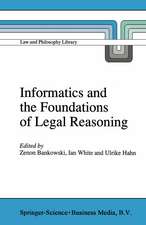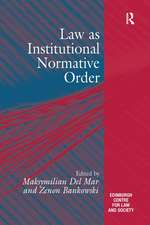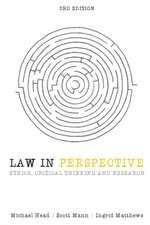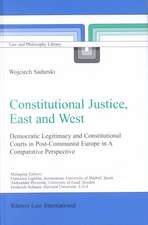Legal Ontology Engineering: Methodologies, Modelling Trends, and the Ontology of Professional Judicial Knowledge: Law, Governance and Technology Series, cartea 3
Autor Núria Casellasen Limba Engleză Paperback – 27 noi 2013
During the last decade, research and applications based on the use of legal ontologies as a technique to represent legal knowledge has raised a very interesting debate about their capacity and limitations to represent conceptual structures in the legal domain. Making conceptual legal knowledge explicit would support the development of a web of legal knowledge, improve communication, create trust and enable and support open data, e-government and e-democracy activities. Moreover, this explicit knowledge is also relevant to the formalization of software agents and the shaping of virtual institutions and multi-agent systems or environments.
This book explores the use of ontologism in legal knowledge representation for semantically-enhanced legal knowledge systems or web-based applications. In it, current methodologies, tools and languages used for ontology development are revised, and the book includes an exhaustive revision of existing ontologies in the legal domain. The development of the Ontology of Professional Judicial Knowledge (OPJK) is presented as a case study.
| Toate formatele și edițiile | Preț | Express |
|---|---|---|
| Paperback (1) | 1108.99 lei 6-8 săpt. | |
| SPRINGER NETHERLANDS – 27 noi 2013 | 1108.99 lei 6-8 săpt. | |
| Hardback (1) | 1115.14 lei 6-8 săpt. | |
| SPRINGER NETHERLANDS – 12 aug 2011 | 1115.14 lei 6-8 săpt. |
Din seria Law, Governance and Technology Series
- 18%
 Preț: 950.33 lei
Preț: 950.33 lei - 24%
 Preț: 645.10 lei
Preț: 645.10 lei - 20%
 Preț: 691.09 lei
Preț: 691.09 lei - 20%
 Preț: 574.07 lei
Preț: 574.07 lei - 20%
 Preț: 879.80 lei
Preț: 879.80 lei - 20%
 Preț: 878.75 lei
Preț: 878.75 lei - 15%
 Preț: 720.23 lei
Preț: 720.23 lei - 18%
 Preț: 1122.56 lei
Preț: 1122.56 lei - 18%
 Preț: 1130.27 lei
Preț: 1130.27 lei - 15%
 Preț: 642.83 lei
Preț: 642.83 lei - 18%
 Preț: 950.52 lei
Preț: 950.52 lei - 18%
 Preț: 1009.85 lei
Preț: 1009.85 lei - 18%
 Preț: 1115.14 lei
Preț: 1115.14 lei - 15%
 Preț: 653.14 lei
Preț: 653.14 lei - 18%
 Preț: 949.23 lei
Preț: 949.23 lei - 18%
 Preț: 1014.76 lei
Preț: 1014.76 lei - 15%
 Preț: 638.43 lei
Preț: 638.43 lei - 18%
 Preț: 1124.30 lei
Preț: 1124.30 lei - 18%
 Preț: 1124.60 lei
Preț: 1124.60 lei - 18%
 Preț: 999.45 lei
Preț: 999.45 lei - 18%
 Preț: 892.42 lei
Preț: 892.42 lei - 15%
 Preț: 640.37 lei
Preț: 640.37 lei - 18%
 Preț: 947.35 lei
Preț: 947.35 lei - 20%
 Preț: 340.32 lei
Preț: 340.32 lei - 18%
 Preț: 1692.20 lei
Preț: 1692.20 lei - 18%
 Preț: 954.93 lei
Preț: 954.93 lei - 24%
 Preț: 789.36 lei
Preț: 789.36 lei -
 Preț: 397.59 lei
Preț: 397.59 lei - 20%
 Preț: 876.57 lei
Preț: 876.57 lei - 20%
 Preț: 652.41 lei
Preț: 652.41 lei - 18%
 Preț: 900.49 lei
Preț: 900.49 lei - 18%
 Preț: 941.50 lei
Preț: 941.50 lei -
 Preț: 392.97 lei
Preț: 392.97 lei
Preț: 1108.99 lei
Preț vechi: 1352.42 lei
-18% Nou
Puncte Express: 1663
Preț estimativ în valută:
212.23€ • 219.25$ • 176.63£
212.23€ • 219.25$ • 176.63£
Carte tipărită la comandă
Livrare economică 25 martie-08 aprilie
Preluare comenzi: 021 569.72.76
Specificații
ISBN-13: 9789400737549
ISBN-10: 9400737548
Pagini: 320
Ilustrații: XXII, 298 p.
Dimensiuni: 155 x 235 x 17 mm
Greutate: 0.45 kg
Ediția:2011
Editura: SPRINGER NETHERLANDS
Colecția Springer
Seria Law, Governance and Technology Series
Locul publicării:Dordrecht, Netherlands
ISBN-10: 9400737548
Pagini: 320
Ilustrații: XXII, 298 p.
Dimensiuni: 155 x 235 x 17 mm
Greutate: 0.45 kg
Ediția:2011
Editura: SPRINGER NETHERLANDS
Colecția Springer
Seria Law, Governance and Technology Series
Locul publicării:Dordrecht, Netherlands
Public țintă
ResearchCuprins
1 Introduction.- 2 On Ontologies.- 3 Methodologies, Tools and Languages for Ontology Design.- 4 Legal Ontologies.- 5 Modelling Judicial Professional Knowledge: A Case Study.- 6 Some Final Remarks and Issues for Discussion.- References.- Index.
Textul de pe ultima copertă
Enabling information interoperability, fostering legal knowledge usability and reuse, enhancing legal information search, in short, formalizing the complexity of legal knowledge to enhance legal knowledge management are challenging tasks, for which different solutions and lines of research have been proposed.
During the last decade, research and applications based on the use of legal ontologies as a technique to represent legal knowledge has raised a very interesting debate about their capacity and limitations to represent conceptual structures in the legal domain. Making conceptual legal knowledge explicit would support the development of a web of legal knowledge, improve communication, create trust and enable and support open data, e-government and e-democracy activities. Moreover, this explicit knowledge is also relevant to the formalization of software agents and the shaping of virtual institutions and multi-agent systems or environments.
This book explores the use of ontologism in legal knowledge representation for semantically-enhanced legal knowledge systems or web-based applications. In it, current methodologies, tools and languages used for ontology development are revised, and the book includes an exhaustive revision of existing ontologies in the legal domain. The development of the Ontology of Professional Judicial Knowledge (OPJK) is presented as a case study.
During the last decade, research and applications based on the use of legal ontologies as a technique to represent legal knowledge has raised a very interesting debate about their capacity and limitations to represent conceptual structures in the legal domain. Making conceptual legal knowledge explicit would support the development of a web of legal knowledge, improve communication, create trust and enable and support open data, e-government and e-democracy activities. Moreover, this explicit knowledge is also relevant to the formalization of software agents and the shaping of virtual institutions and multi-agent systems or environments.
This book explores the use of ontologism in legal knowledge representation for semantically-enhanced legal knowledge systems or web-based applications. In it, current methodologies, tools and languages used for ontology development are revised, and the book includes an exhaustive revision of existing ontologies in the legal domain. The development of the Ontology of Professional Judicial Knowledge (OPJK) is presented as a case study.
Caracteristici
Latest trends in legal knowledge modelling Offers an exhaustive revision of existing ontologies in the legal domain Clarifies the underlying theoretical and methodological basis for the Legal Semantic Web






























